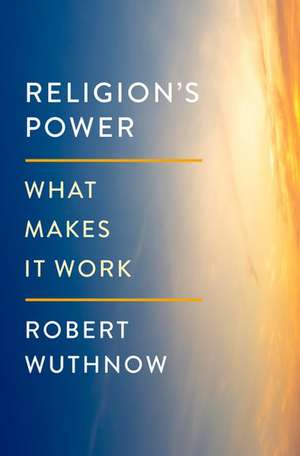Religion's Power: What Makes It Work
Autor Robert Wuthnowen Limba Engleză Hardback – 12 ian 2023
Preț: 187.96 lei
Preț vechi: 216.12 lei
-13% Nou
Puncte Express: 282
Preț estimativ în valută:
35.97€ • 37.42$ • 29.70£
35.97€ • 37.42$ • 29.70£
Carte disponibilă
Livrare economică 13-19 martie
Preluare comenzi: 021 569.72.76
Specificații
ISBN-13: 9780197652534
ISBN-10: 0197652530
Pagini: 248
Dimensiuni: 164 x 237 x 24 mm
Greutate: 0.49 kg
Editura: Oxford University Press
Colecția OUP USA
Locul publicării:New York, United States
ISBN-10: 0197652530
Pagini: 248
Dimensiuni: 164 x 237 x 24 mm
Greutate: 0.49 kg
Editura: Oxford University Press
Colecția OUP USA
Locul publicării:New York, United States
Recenzii
With shrewd analysis, striking examples, and clear prose, Robert Wuthnow's timely book draws on his vast knowledge to tackle the question of how religion exercises its power. A definitive and essential volume for every religion scholar's theoretical toolkit.
This is a deep-thinking book about sacred power in our modern world. Robert Wuthnow takes us on a captivating journey through the often-invisible manifestations of religion's 'extraordinary power': from power in ritual practice to power in discursive expressions; from power in religious institutions to identity power and political power. Along the way we encounter vivid historical and contemporary examples and meet the key thinkers whose views inform our most urgent discussions today. We emerge with new insights as well as new resolutions about how to best engage with religions power in practice.
Robert Wuthnow is the living scholar best able to show us the big picture of religion in American society. In Religions Power he does it again! Wuthnow shows us that sacralized power is relevant for religions continuing place in society and how we might understand in a nuanced way both the positive and negative of that influence. This is a book that should be read widely by scholars of religion, journalists, and really anyone who cares about the future of religion.
One might think of a religion in terms of beliefs, ethical values, and personal practices, and those certainly are central elements...Wuthnow discusses empirical research and points to key figures, theories, and ideas on the subject—it is also accessible. The author writes in a somewhat conversational style, without academic jargon, and he illustrates his ideas with interesting stories and historical examples. Highly recommended. Lower division undergraduates through faculty.
The strength of Religion's Power resides in Wuthnow's extensive knowledge of the ways that religions promote hierarchy...Religion's Power prompts religious leaders and participants to begin exploring how they need to come together with bonds of mutual belonging and wholeness.
Wuthnow's careful and insightful analysis can carry an emancipatory function by illuminating the many ways in which forms of power flow through religious practices and are generated by them. Clergy, scholars of religion, and educated lay people involved in religious communities will benefit from reading this important and helpful book.
Wuthnow's concepts of ritual, discursive, institutional, identity, and political power each in its own right point in interesting and important directions that may lead to greater understanding of the social significance of religion's power. Wuthnow's perceptive analysis will leave readers eager to further understand and explore religion's power.
This is a deep-thinking book about sacred power in our modern world. Robert Wuthnow takes us on a captivating journey through the often-invisible manifestations of religion's 'extraordinary power': from power in ritual practice to power in discursive expressions; from power in religious institutions to identity power and political power. Along the way we encounter vivid historical and contemporary examples and meet the key thinkers whose views inform our most urgent discussions today. We emerge with new insights as well as new resolutions about how to best engage with religions power in practice.
Robert Wuthnow is the living scholar best able to show us the big picture of religion in American society. In Religions Power he does it again! Wuthnow shows us that sacralized power is relevant for religions continuing place in society and how we might understand in a nuanced way both the positive and negative of that influence. This is a book that should be read widely by scholars of religion, journalists, and really anyone who cares about the future of religion.
One might think of a religion in terms of beliefs, ethical values, and personal practices, and those certainly are central elements...Wuthnow discusses empirical research and points to key figures, theories, and ideas on the subject—it is also accessible. The author writes in a somewhat conversational style, without academic jargon, and he illustrates his ideas with interesting stories and historical examples. Highly recommended. Lower division undergraduates through faculty.
The strength of Religion's Power resides in Wuthnow's extensive knowledge of the ways that religions promote hierarchy...Religion's Power prompts religious leaders and participants to begin exploring how they need to come together with bonds of mutual belonging and wholeness.
Wuthnow's careful and insightful analysis can carry an emancipatory function by illuminating the many ways in which forms of power flow through religious practices and are generated by them. Clergy, scholars of religion, and educated lay people involved in religious communities will benefit from reading this important and helpful book.
Wuthnow's concepts of ritual, discursive, institutional, identity, and political power each in its own right point in interesting and important directions that may lead to greater understanding of the social significance of religion's power. Wuthnow's perceptive analysis will leave readers eager to further understand and explore religion's power.
Notă biografică
Robert Wuthnow is a fellow of the American Academy of Arts and Sciences, a fellow of the American Philosophical Society, a Guggenheim Fellowship recipient, former president of the Society for the Scientific Study of Religion, and the recipient of numerous awards for his scholarly work.
